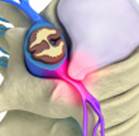Did you know – there is no direct blood supply to the discs?
The spinal disc tends to lose its water content during compressive loading – this is replaced during rest periods (when we are non weight-bearing) by absorbing tissue fluid from the adjacent vertebrae. In addition, as we age, the disc becomes less hydrated and loses its elasticity - ageing of the disc occurs early and can often be seen in the late teens or early twenties.
Everyday neck movements can squeeze a brittle disc, which forces the gel-like nucleus against the sides of the disc’s fibrous outer wall, the pulp material extrudes into the spinal nerve root or spinal canal causing a herniated or prolapsed disc – similarly this can occur due to a traumatic injury.
Each nerve root is about the size of a biro refill and the disc prolapses are often not much bigger than a pea.

In surgery terms, the removal of the disc prolapse (not the whole disc but the ‘pea’) is what is referred to as a discectomy. When, this is performed through a keyhole it is termed microdiscectomy.